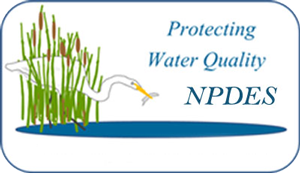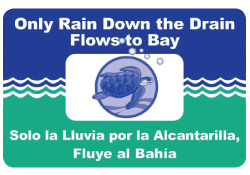National Pollutant Discharge Elimination System (NPDES)
Pointless Personal Pollution
Wherever you live, your daily activies could end up polluting Florida’s Water. Pollutants from our homes, businesses and farms are major contributors to the pollution of Florida’s surface and ground waters. This pollution is washed into the state’s waters by rain or irrigation water and is known as POINTLESS PERSONAL POLLUTION. Unlike many other types of pollution, WE cause this pollution and WE can stop it!
What is Pointless Personal Pollution?
The blame for water pollution often is aimed at “point sources,” such as industrial or sewage treatment facilities. Discharges from these sources flow through pipes and can be readily identified and treated. But Pointless Personal Pollution is difficult to identify and treat. This is because many of our daily activities can cause this pollution and it can travel by many different routes into the ground and surface waters. Take a look around your home and property. You can find many sources of Pointless Personal Pollution that could end up in the state’s waters. Some examples of these pollutants are:
- Sediments from soil erosion caused by unvegetated soils and by uncontrolled construction activities.
- Automotive and lawn equipment oil and grease leaking on paved areas or improper disposal of used oil and other products into storm drains.
- Runoff of pesticides, herbicides and fertilizers from lawns, gardens, farms and golf courses.
- Organic contaminants from litter, yard trash, sludge, garbage from dumpsters and garbage cans and pet and livestock wastes.
- Pathogens and excessive nutrients from sewer leaks and septic tanks overflowing or located in areas with high water tables.
How Does Pointless Personal Pollution Impact Our Waters?
Pointless Personal Pollution contains many kinds of pollutants which contaminate our waters in many ways, such as:
- Nutrients from fertilizers, septic tanks and animal wastes enter our waters causing excessive growth of algae and aquatic weeds.
- Heavy metals and pesticides that can kill aquatic organisms and contaminate sediments.
- Sewage, garbage and litter reduce oxygen in the water to levels that can kill aquatic life.
- Sediments from soil erosion clog fish gills and shellfish filter systems cutting off their oxygen supply.
- Pathogens from septic tanks and animal wastes contaminate shellfish and lead to the closing of swimming areas.
What Can You Do To Reduce Pointless Personal Pollution?
Home and Household Maintenance
- SHOP WISELY. Buy products labeled biodegradable, non-toxic, non-phosphorus, or water soluble. WHY…they readily decompose and will not pollute surface or ground water.
- STORE PRODUCTS SAFELY. Keep toxic products in original containers, closed and clearly marked in safe storage places. WHY…to prevent spillage or accidents to children or pets.
- PROPERLY MAINTAIN SEPTIC SYSTEM. Inspect systems annually and pump out as needed.
- Avoid caustic cleaners, chemicals or solvents. WHY…they might destroy waste reducing bacteria or clog absorption fields, which could cause runoff of inadequately, treated wastes during rainstorms.
Lawn and Garden
- USE GARDEN AND LAWN CHEMICALS WISELY. Follow package directions carefully and only use pesticides, herbicides and fertilizers when other methods fail. Do not apply if rain is in the forecast. WHY…excessive fertilizers and chemicals wash off the property and into surface and ground waters.
- KEEP IRRIGATION WATER ON THE LAWN AND GARDEN (NOT ON PAVED SURFACES). Divert rainspouts onto unpaved areas or swales and wash vehicles on vegetated areas. WHY…this allows runoff to soak into the soil and not wash over paved surfaces into nearby water bodies.
- COMPOST LEAVES, GRASS AND SCRUB CLIPPINGS. Use as mulch for fertilizer and do not rake into roadways. WHY…these materials will decompose and return nutrients to the soil and avoid the necessity of applying fertilizers.
Automotive
- DON’T DRAIN USED MOTOR OIL INTO STORM DRAINS. Take used motor oil and antifreeze to service stations to recycle them. WHY…these products are toxic and add pollutants to surface waters if placed or washed into storm drains.
- SERVICE YOUR CAR REGULARLY. Have your car inspected and maintained regularly. WHY…to prevent leakage of motor oil, antifreeze and other fluids which can end up in the nearest waterbody. Well-maintained vehicles reduce air emissions, which can contaminate surface waters.
Town’s Responsibility
As a co-permittee of the NPDES program, the Town of Redington Shores participates with other neighboring cities in the Gulf Beaches Household Chemical Collection Day. The Town keeps the residents informed of this activity thru our Town access channel (Channel 15) and through literature placed in the Town library. All residents may call the Town Hall with any concerns of illicit discharge into the storm drains. Town staff will respond to these calls and take appropriate action.
If you want to be part of the solution and want more information, contact the following:
- FLORIDA DEPARTMENT OF ENVIRONMENTAL PROTECTION
Stormwater/Nonpoint Source Management Section
2600 Blairstone Road, Tallahassee, FL 32399
Phone: (850) 921-9472 - SOUTHWEST FLORIDA WATER MANAGEMENT DISTRICT
Phone: (352) 796-7211
More info from Pinellas County: NPDES Stormwater Quality


